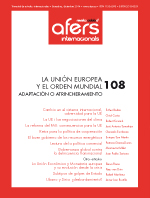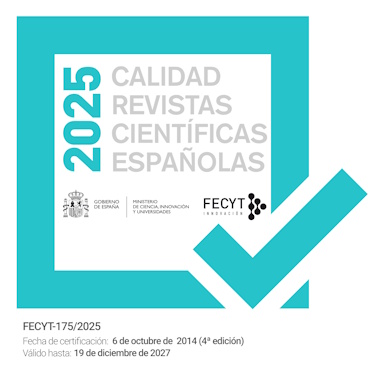After Kyoto, Beijing: the EU and the new climate negotiations
Keywords:
European Union, climate change, international system, negotiationsAbstract
Revista CIDOB d’Afers Internacionals, nº 108
Quadrimestral (September-December 2014)
ISSN:1133-6595 | E-ISSN:2013-035X
The article evaluates how the transition of power underway in the international system has changed international climate negotiations, as well as the way the EU has responded to this process. More specifically, and, in line with the introductory article of this edition, it is argued that, until 2005-2007, negotiations took place within a structure of normative congruence, characterised by climate institutions being set up in spite of the reluctance of a very powerful coalition of states. However, since mid-way through the first decade of the 2000s, the negotiations have entered a phase of institutional lag and the new coalition of key actors (made up of the United States and emerging countries) are imposing a new conceptual approach that has left the old institutions clearly lagging behind. The EU has responded to this change by adjusting its strategies and objectives.
>> The full text articles of this issue are available only in Spanish language
References
Andresen, Steinar y Agrawala, Shardul. «Leaders, Pushers and Laggards in the Making of the Climate Change». Global Environmental Change, vol. 12 (2002), p. 41-51.
Barbé, Esther. «La Unión Europea en las instituciones de gobernanza global: marco analítico y preguntas de investigación», en: Barbé, Esther (dir.) Cambio mundial y gobernanza global. La interacción entre la Unión Europea y las instituciones internacionales. Madrid: Tecnos, 2012, p. 11-28.
Barbé, Esther; Costa, Oriol; Herranz-Surrallés, Anna y Kienzle, Ben. «The EU in an unsettled international system: Coping with the power shift in global governance». Paper presentado en la Conferencia de la International Studies Association (ISA), Toronto (Canadá), 26-29 de marzo de 2014 (en línea) http://www.eu-ianus.eu
Barbé, Esther y Johansson-Nogués, Elisabeth. «The EU as a Modest “Force for Good”: The European Neighbourhood Policy». International Affairs, vol. 84, n.º 1 (2008), p. 81-96.
Bodansky, Daniel. «The Copenhagen Climate Change Accord». ASIL Insights, vol.14, n.º 3 (16 de febrero de 2010).
Bretherton, Charlotte y Vogler, John. The European Union as a global actor. Londres: Routledge, 1999.
Consejo Europeo. Conclusiones de la Presidencia SN 60/1/90 (25 y 26 de junio de 1990) (en línea) [Fecha de consulta 9.2014] http://www.european-council.europa.eu/media/848708/1990_junio_-_dublin__es_.pdf
Costa, Oriol. «La política exterior de la UE en material ambiental. Interacciones, normas y preferencias». Cursos de Derecho Internacional y Relaciones Internacionales de Vitoria-Gasteiz (2012) (2013). Madrid: Tecnos, p. 371-426.
Costa, Oriol. «Puestos a liderar. Unidad e influencia de la UE en la política internacional del clima», en: Barbé, Esther (dir.) Cambio mundial y gobernanza global. La interacción entre la Unión Europea y las instituciones internacionales. Madrid: Tecnos, 2012, p. 124-141.
Elzen, Michael G.J. den y Moor, André P.G. de. The Bonn agreement and Marrakesh accords: an updated analysis, RIVM rapport 728001017/2001 (2001) (en línea) [Fecha de consulta 10.2002] www.arch.rivm.nl/ieweb/reports/rep728001017_marrakech.pdf
ENB. Usummary of the sixth conference of the parties to the Framework Convention on climate change: 13-25 November 2000, IISD (2000) (en línea) [Fecha de consulta 9.2003] www.iisd.ca/linkages
ENB. Summary of the eleventh session of the INC for a Framework Convention on Climate Change: 6-17 February 1995. IISD (1995) (en línea) [Fecha de consulta 9.2003] www.iisd.ca/linkages
Fajardo del Castillo, Teresa. «Revisiting the External Dimension of the Environmental Policy of the European Union: Some Challenges Ahead». Journal for European Enviromental & Planning Law, vol. 7, n.º 4 (2010), p. 365-390.
Groen, Lisanne; Niemann, Arne y Oberthür, Sebastian. «The EU as a Global Leader? The Copenhagen and Cancun UN Climate Change Negotiations». Journal of Contemporary European Research, vol. 8, n.º 2 (2012), p. 173-191.
Grubb, Michael. «European climate change policy in a global context», en: Bergesen, Helge Ole; Parmann, Georg y Thommessen, Øystein B. (eds.) Green globe yearbook of international co-operation and development 1995. Oxford: Oxford University Press, 1995, p. 41-50.
Grubb, Michael; Vrolijk, Christiaan y Brack, Duncan. The Kyoto Protocol. A guide and assessment. Londres: Royal Institute of International Affairs/Earthscan, 1999.
Hagem, Cathrine. From small to insignificant: climate impact of the Kyoto Protocol with and without US. CICERO Policy Note 2001:1 (en línea) [Fecha de consulta 9.2003] www.cicero.uic.no/media/1315.pdf
Kissack, Robert. Pursuing Effective Multilateralism. The European Union, International Organisations and the Politics of Decision Making. Houndmills: Palgrave, 2010.
Korppoo, Anna. «Forging alliance with Russia: the example of a Green Investment Scheme». Climate Policy, vol. 3 (2003), p. 67-76.
Lucarelli, Sonia y Fioramonti, Lorenzo. «The EU in the eyes of the others –why bother?» en: Lucarelli, Sonia y Fioramonti, Lorenzo (eds.) External Perceptions of the EU as a Global Actor. Londres: Routledge, 2010, p. 1-9.
Manners, Ian. «Normative power Europe: a contradiction in terms?». Journal of Common Market Studies, vol. 40, n.º 2 (2002), p. 235-58.
Mehling, Michael y Sépibus, Joëlle, de. «Editorial: Design Elements of the Post2020 Climate Regime». Carbon and Climate Law Review, n.º 1 (2014), p. 1-2.
Merlini, Cesare. «Europe’s gentle power». The International Spectator, vol. 36, n.º 3 (2001), p. 113-16.
Oberthür, Sebastian. «The European Union’s performance in the international climate change regime». Journal of European Integration, vol. 33, n.º 6 (2011), p. 667-682.
Rodrigo Hernández, Ángel J. «Los acuerdos de Marrakesh en la séptima reunión de la Conferencia de las Partes de la Convención Marco de las Naciones Unidas sobre el Cambio Climático». Revista Española de Derecho Internacional, vol. LIII (2001), p. 331-342.
Schneider, Stephan. «Kyoto protocol: the unfinished agenda». Climatic Change, vol. 39 (1998), p. 1-21.
Van Schaik, Louise y Schunz, Simon. «Explaining EU Activism and Impact in Global Climate Politics: Is the Union a Norm- or Interest-Driven Actor?». Journal of Common Market Studies, vol. 50, n.º 1 (2012), p. 169-186.
Vig, Norman J. y Faure, Michael G. (eds.). Green Giants? Environmental Policies of the United States and the European Union. Cambridge: The MIT Press, 2004.
Vogler, John. «The European Union as a Global Environmental Policy Actor: Climate Change», en: Wurzel, Rüdiger y Connelly, James (eds.) The European Union as a Leader in International Climate Change Politics. Londres: Routledge, 2011, p. 21-37.
Vogler, John. «The European Union as an actor in international environmental politics». Environmental Politics, vol. 8, n.º 3 (1999), p. 24-48.
Vrolijk, Christiaan. «A new interpretation of the Kyoto Protocol. Outcomes from The Hague, Bonn and Marrakesh». Briefing Paper (The Royal Institute of International Affairs), n.º 1 (abril 2002).
Vrolijk, Christiaan. «President Bush might have done Kyoto a favor». Informe del Encuentro “Is Kyoto Dead?”, organizado por el Energy and Environment Programme, Royal Institute of International Affairs, Chatham House (Londres), 25 de abril de 2001.
Yamin, Farhana. «Institutions for Global Environmental Change. Joint implementation». Global Environmental Change, vol. 10 (2000), p. 87-91.













